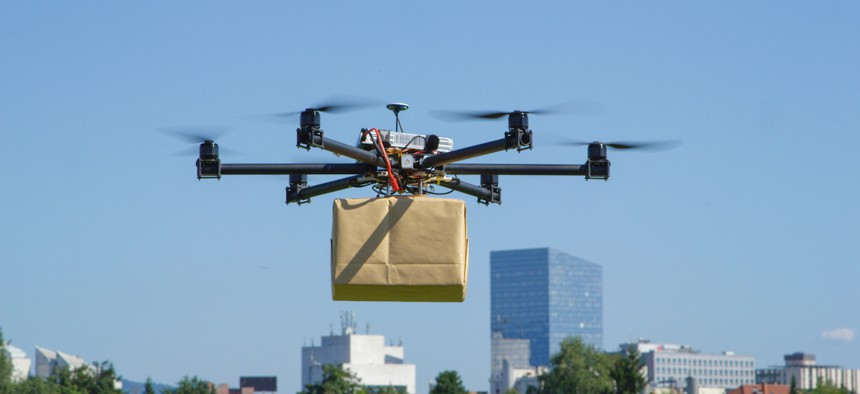Connecting state and local government leaders
Experts said the issue has exploded in recent years but could be fixed if states get the authority to jam cellphone signals.
In the last decade, state prisons throughout the United States have been inundated with contraband dropped by drone, and one state corrections official called for more authority to jam illegal cellphones to deal with the problem.
Drones first were spotted delivering contraband to prisons in 2013, then two years later, a drone dropped drugs into the prison yard at Mansfield Correctional Institution in Ohio and prompted a brawl among several inmates as they fought over its payload.
The issue has only gotten worse, said Bryan Stirling, director of the South Carolina Department of Corrections, during a panel discussion hosted by the National Institute of Justice in Arlington, Virginia. Stirling said state prisons are “under attack” from drones dropping contraband and have limited ways to stop them under current law.
“Prisons were designed to keep people in and not keep things out,” Stirling said. Already, state prisons deploy netting like that found at golf courses to try and prevent drone flights onto their property. Drone detectors are also being pressed into service. The state has spent $200,000 per institution over five years on Dedrone, which develops counter-drone technology, Stirling said.
Research published last year from the Criminal Justice Testing and Evaluation Consortium (CJTEC ) found that drones can be used to drop contraband, distract prison security to increase the chances of contraband getting through by other methods or monitor an area without detection to prepare for drops. Stirling said South Carolina’s state prisons were subject to over 260 drone incursions last year and expect more of the same this year.
Prisoners using illegal cellphones coordinate with drone pilots on the positioning of guards or possible obstacles, or they provide directions for distraction flights, Stirling said.
One solution would be to permit state prisons to use on-site cellphone jamming devices, which deliberately transmit signals on the same frequencies used by cellphones and disrupt them. But while federal prisons have trialed jamming techniques on a limited basis, state prisons are barred under the Federal Communications Act from doing the same.
Congress has attempted to change that, including through the introduction of the bicameral Cellphone Jamming Reform Act, which would allow state and federal prisons to use phone jamming technology. Those efforts and similar attempts to allow phone jamming in correctional facilities have received support from a coalition of state attorneys general.
Meanwhile, the Federal Communications Commission has called stopping illegal cellphone use by inmates a “top priority,” but it says jamming technology “is illegal and causes more problems than it solves,” as it can interfere with 911 calls and public safety communication.
The FCC said inmate call-capture technology is far more effective, as it picks up calls and only passes along authorized communications. The agency said a trial of the technology in Parchman, Mississippi, stopped 216,000 illegal calls made by and to inmates in just one month.
Without the authority to jam phones, FBI Special Agent Matthew Smith said prisons have had to take a “mother may I approach,” where they are forced to attempt to get traditional wiretaps on drones by using their serial numbers. But, Smith noted, that creates a Catch-22 as authorities do not have access to a drone’s serial number before it flies onto a prison yard.
Stirling said that he doesn’t understand congressional inaction on phone jamming, especially as lawmakers “get up and bang the table and say we need to stop fentanyl.” By allowing phone jamming, Stirling argued, the issue of fentanyl in prisons could be brought under control. But, he noted, the telecommunications industry is also opposed to jamming technology, as they fear it could set a dangerous precedent that would allow jammers to be used in other public settings.
The researchers at CJTEC said given the constraints states are under, most solutions to the drone problem must focus on using technology-based detection—or shooting them down. But that is tricky, said Neal Parsons, a research forensic scientist at RTI International, which collaborated on the report.
Parsons said during the panel that many vendors that sell counter-drone technology are “snake oil salesmen,” as they either exaggerate their technology’s capabilities or use illegal methods to shoot down drones. He also warned of the “collateral damage” of shooting down a drone, especially over a prison.
Disabling a drone in flight, whether by deactivating it or shooting it, is going to create “a hazard to the people below it,” Parsons said. “It's a really complicated problem, and you can't just go shooting drones out of the sky.”

NEXT STORY: Fighting Climate Change, State by State




